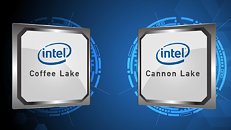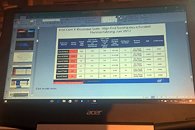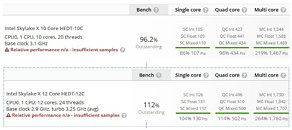Tuesday, May 16th 2017

Intel's Upcoming Core i9 Skylake-X CPU Benchmarks Surface
It seems that Intel's accelerated released schedule for its upcoming HEDT platform is starting to slowly bear fruits, with many details leaking through the cracks almost non-stop during the last few days (and before you ask, yes, I did have more links to show you.)
These should be two of the top performing processors in Intel's line-up, and the i9 7900X (10-core) and 7920X (12-core) have been tested on integer and floating point calculations. The 10-core i9-7900X (3.1 GHz base frequency, no Turbo listed)) scores 107 points in single-core benchmarks, and 1467 points in the multi-core test. The 12-core, 2.9 GHz base frequency 7920X, however, scores a head-scratchingly-higher 130 points in the same single-threaded benchmark, despite carrying the same architecture at... hmm... lower clocks. Maybe this processor's Turbo is working as expected, up to 3.25 GHz (average), and that's the factor for the higher single-core performance?The fact that these scores were sourced from userbenchmark.com means that there isn't much reason to compare them between processors - it's an environment lacking the usual control usually found in reviews - so that may also be the reason for the discrepancy. Multi-threaded performance is more inline with what we'd expect to see, though, coming in at 1760 points. You should also note that the Core i9-7900X shows a base clock of 3.1 GHz, 0.2 GHz short of its official 3.3 GHz specification, which means we're probably not looking at final silicon. As always, and this should go without saying, take leaked benchmarks with some amount of salt (a pinch or a truckload, your mileage may vary.)
Sources:
Hardware.info, Userbenchmark (i9-7900X), Userbenchmark (i9-7920X),
These should be two of the top performing processors in Intel's line-up, and the i9 7900X (10-core) and 7920X (12-core) have been tested on integer and floating point calculations. The 10-core i9-7900X (3.1 GHz base frequency, no Turbo listed)) scores 107 points in single-core benchmarks, and 1467 points in the multi-core test. The 12-core, 2.9 GHz base frequency 7920X, however, scores a head-scratchingly-higher 130 points in the same single-threaded benchmark, despite carrying the same architecture at... hmm... lower clocks. Maybe this processor's Turbo is working as expected, up to 3.25 GHz (average), and that's the factor for the higher single-core performance?The fact that these scores were sourced from userbenchmark.com means that there isn't much reason to compare them between processors - it's an environment lacking the usual control usually found in reviews - so that may also be the reason for the discrepancy. Multi-threaded performance is more inline with what we'd expect to see, though, coming in at 1760 points. You should also note that the Core i9-7900X shows a base clock of 3.1 GHz, 0.2 GHz short of its official 3.3 GHz specification, which means we're probably not looking at final silicon. As always, and this should go without saying, take leaked benchmarks with some amount of salt (a pinch or a truckload, your mileage may vary.)



16 Comments on Intel's Upcoming Core i9 Skylake-X CPU Benchmarks Surface
It is done that way because intel chooses to release and research and develop in that manner. There is no real reason for them to not release both platforms on the same timeline.
Pieces of shit.
Next to your need for more fps they win , and the public are not so much beta just pre final spec.
Another reason is binning dictates you pile up a lot of lower spec parts with sections that are defective early on and it can take time to build up enough with all its features working to sell for more to business.
Then you have verification testing to do for business that you don't for consumers and thats where the time between gets used.
A joint release is ONLY possible if you hold back consumer release until all that work is done.
That's not going to happen , and certainly not at intel right now , they got duals and quads all over the place by now.
Be stacked in every orifice soon;):) jk
This is how its done ,see ryzens release schedule or any telco chip maker etc etc
See my own employers tactics for delivering cutting edge mass spec systems.
Get it out in a working base config then stir the pot , quickly.
So because Ryzen is a good bit of competition for the first time in years and because you say so they should push out cpus quicker beating the laws of averages and physics in the process , my argument and opinion is an educated guess based on logical and sound industry practice ,yours is lacking.
Derp derp?? That about sums up your point thus far.
Edit so right ,myvphones stupid not me. Ish.
Sandra Database
Intel(R) ,i7-7900X%CPU @ (10C 20T 4GHz/4.5GHz, 2.4GHz IMC, 10x 1MB L2, 13.75MB L3)
ranker.sisoftware.net/show_run.php?q=c2ffcee889e8d5e3daebdfe9dbfd8fb282a4c1a499a98ffcc1f9&l=en
175W sounds right though, I'd prefer a lower power CPU.
My testing with IB showed this.
Mhz TDP F@H
3500 44.2-44.9 F@H
3100 32.7-33.1 F@H
2600 23.3-23.7 F@H
2000 16.0-17.2 F@H
1800 14.7-15.8 F@H
1600 14-14.5 F@H
1200 13-13.3 F@H
2GHz for a 4 core IB was the sweet spot in terms of efficiency. It is about 50% more efficient than 3.5GHz not even 4 or 4.5GHz. Granted this is assuming intel was truly putting the needed voltages on each clock. Their voltage algorithm is a bit over generous. I also noticed their turbo voltage was design in a really basic way.
1.2GHz base core boosted to 3.5 used way more voltage than 2.6base with 3.5ghz boost voltage. Not exactly intelligent in applying the right voltage.
I used max base clock allowed followed by turbo clock. IIRC 2.6 was max base clock.
This is why those 2Ghz 20 plus cores have such low TDP. If they were actually unlocked they would probably pull 400+ if not way more.